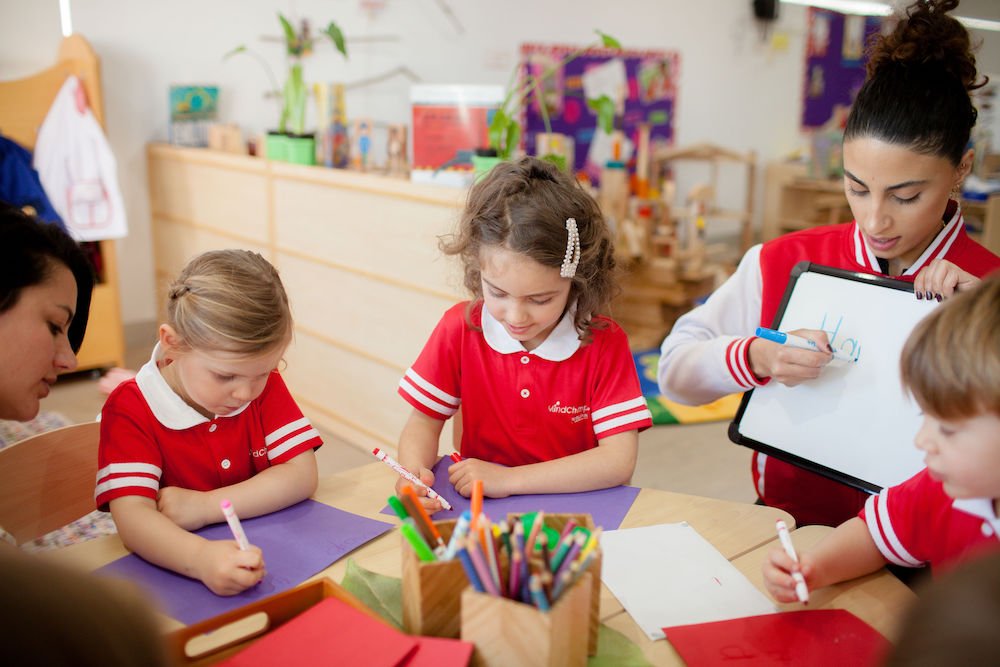The Role of Parents in Pre-Kindergarten: How to Support Your Child’s Early Education
Parental involvement in pre-kindergarten education is crucial for a child’s overall development and success in school. Research has shown that children whose parents are actively involved in their education tend to have better academic performance, improved social skills, and higher self-esteem. When parents are engaged in their child’s pre-kindergarten education, they can provide support, encouragement, and guidance that can have a lasting impact on their child’s learning and development.
One of the key benefits of parental involvement in pre-kindergarten education is the positive impact it has on a child’s academic performance. When parents take an active interest in their child’s education, they can help reinforce the skills and concepts that are being taught in the classroom. This can lead to improved learning outcomes and a greater likelihood of academic success. Additionally, parental involvement can also help to instill a love of learning in children, as they see their parents valuing education and making it a priority in their lives.
Furthermore, parental involvement in pre-kindergarten education can also have a positive impact on a child’s social and emotional development. When parents are actively engaged in their child’s education, they can provide the emotional support and encouragement that is necessary for a child to develop a strong sense of self-esteem and confidence. This can help children to develop positive relationships with their peers, as well as with adults, which is essential for their overall well-being and success in school.
Creating a Positive Learning Environment at Home
Creating a positive learning environment at home is essential for supporting a child’s pre-kindergarten education. When children have a supportive and nurturing home environment, they are more likely to be engaged and motivated to learn. There are several ways that parents can create a positive learning environment at home, including providing a designated space for learning, establishing routines and expectations, and fostering a love of learning through exploration and play.
One way to create a positive learning environment at home is to provide a designated space for learning. This could be a quiet area where children can read, do homework, or engage in educational activities. Having a dedicated space for learning can help children to focus and concentrate on their schoolwork, as well as develop good study habits. Additionally, parents can also make sure that this space is free from distractions and has all the necessary materials and resources for learning.
In addition to providing a designated space for learning, parents can also establish routines and expectations that support their child’s pre-kindergarten education. This could include setting aside time each day for homework or reading, as well as establishing clear expectations for behavior and academic performance. By creating a structured and predictable environment, children can feel more secure and confident in their learning, which can lead to greater success in school.
Supporting Social and Emotional Development in Pre-Kindergarten
Supporting social and emotional development in pre-kindergarten is essential for helping children to develop the skills they need to form positive relationships, manage their emotions, and navigate social situations. When children have strong social and emotional skills, they are better able to communicate, cooperate, and resolve conflicts with their peers, which is essential for their overall well-being and success in school. There are several ways that parents can support their child’s social and emotional development, including teaching empathy and compassion, modeling positive behavior, and providing opportunities for social interaction.
One way to support social and emotional development in pre-kindergarten is to teach children empathy and compassion. Parents can help children to understand and identify their own emotions, as well as recognize the feelings of others. This can be done through open communication, active listening, and providing opportunities for children to express their emotions in a safe and supportive environment. By teaching children empathy and compassion, parents can help them to develop strong interpersonal skills that will serve them well throughout their lives.
Furthermore, parents can also support their child’s social and emotional development by modeling positive behavior. Children learn by example, so it is important for parents to demonstrate kindness, respect, and empathy in their own interactions with others. By modeling positive behavior, parents can help children to develop strong social and emotional skills that will enable them to form healthy relationships with their peers.
Encouraging Language and Literacy Skills in Pre-Kindergarten
Encouraging language and literacy skills in pre-kindergarten is essential for helping children to develop the foundational skills they need to become proficient readers and communicators. When children have strong language and literacy skills, they are better able to express themselves, comprehend written text, and engage in meaningful conversations with others. There are several ways that parents can encourage their child’s language and literacy skills, including reading together, engaging in meaningful conversations, and providing opportunities for writing and storytelling.
One way to encourage language and literacy skills in pre-kindergarten is to read together with your child on a regular basis. Reading aloud to children has been shown to have numerous benefits, including improving vocabulary, comprehension, and cognitive development. By reading together with your child, you can help them to develop a love of reading, as well as expose them to new words and ideas that will expand their knowledge and understanding of the world around them.
In addition to reading together, parents can also encourage their child’s language and literacy skills by engaging in meaningful conversations. This could include asking open-ended questions, discussing books or stories, or simply talking about the events of the day. By engaging in meaningful conversations with your child, you can help them to develop strong communication skills, as well as expand their vocabulary and understanding of language.
Fostering Math and Science Skills in Pre-Kindergarten
Fostering math and science skills in pre-kindergarten is essential for helping children to develop the foundational skills they need to become proficient problem solvers and critical thinkers. When children have strong math and science skills, they are better able to understand the world around them, make connections between different concepts, and apply their knowledge to real-world situations. There are several ways that parents can foster their child’s math and science skills, including providing hands-on learning experiences, asking open-ended questions, and encouraging exploration and experimentation.
One way to foster math and science skills in pre-kindergarten is to provide hands-on learning experiences that allow children to explore mathematical concepts and scientific principles in a concrete way. This could include activities such as counting objects, measuring ingredients for a recipe, or conducting simple science experiments. By providing hands-on learning experiences, parents can help children to develop a strong foundation in math and science that will serve them well throughout their academic career.
In addition to providing hands-on learning experiences, parents can also foster their child’s math and science skills by asking open-ended questions that encourage critical thinking and problem solving. This could include asking children to explain their reasoning, make predictions about an outcome, or think about different ways to solve a problem. By asking open-ended questions, parents can help children to develop strong analytical skills, as well as encourage them to think creatively about mathematical and scientific concepts.
Building Fine and Gross Motor Skills in Pre-Kindergarten
Building fine and gross motor skills in pre-kindergarten is essential for helping children to develop the physical abilities they need to navigate the world around them with confidence and coordination. When children have strong fine and gross motor skills, they are better able to perform everyday tasks such as writing, drawing, running, jumping, and climbing. There are several ways that parents can support their child’s fine and gross motor skills development, including providing opportunities for physical activity, engaging in activities that promote hand-eye coordination, and encouraging creative expression through art and music.
One way to support fine and gross motor skills development in pre-kindergarten is to provide opportunities for physical activity that allow children to move their bodies in different ways. This could include activities such as running, jumping, climbing, or playing sports. By providing opportunities for physical activity, parents can help children to develop strength, coordination, and endurance that will serve them well throughout their lives.
In addition to providing opportunities for physical activity, parents can also support their child’s fine motor skills development by engaging in activities that promote hand-eye coordination. This could include activities such as drawing, coloring, cutting with scissors, or playing with building blocks. By engaging in activities that promote hand-eye coordination, parents can help children to develop strong fine motor skills that will enable them to perform tasks such as writing or using utensils with precision.
Collaborating with Teachers and Caregivers for a Successful Pre-Kindergarten Experience
Collaborating with teachers and caregivers is essential for ensuring a successful pre-kindergarten experience for children. When parents work together with teachers and caregivers, they can create a supportive network that provides consistent guidance and encouragement for children as they navigate the challenges of early childhood education. There are several ways that parents can collaborate with teachers and caregivers for a successful pre-kindergarten experience, including maintaining open communication, participating in school activities, and supporting classroom learning at home.
One way to collaborate with teachers and caregivers for a successful pre-kindergarten experience is to maintain open communication about your child’s progress and needs. This could include attending parent-teacher conferences, communicating regularly through email or phone calls, or participating in school events such as open houses or volunteer opportunities. By maintaining open communication with teachers and caregivers, parents can stay informed about their child’s academic progress, as well as provide valuable insights into their child’s strengths and areas for growth.
In addition to maintaining open communication, parents can also collaborate with teachers and caregivers by participating in school activities that support their child’s pre-kindergarten education. This could include volunteering in the classroom, attending school events such as field trips or performances, or joining parent-teacher organizations. By participating in school activities, parents can show their support for their child’s education while also building positive relationships with teachers and caregivers.
Read More: How International Students Can Gain Work Experience in the USA
Conclusion
Parental involvement plays a crucial role in supporting a child’s pre-kindergarten education. By creating a positive learning environment at home, supporting social and emotional development, encouraging language and literacy skills, fostering math and science skills, building fine and gross motor skills, and collaborating with teachers and caregivers, parents can help ensure that their child has a successful pre-kindergarten experience that lays the foundation for future academic success.
It is important for parents to take an active interest in their child’s education from an early age so that they can provide the support, guidance, and encouragement necessary for their child’s overall development. By working together with teachers and caregivers, parents can create a supportive network that provides consistent guidance for children as they navigate the challenges of early childhood education. Ultimately, parental involvement is essential for helping children to develop the skills they need to succeed academically while also fostering a love of learning that will last a lifetime.







